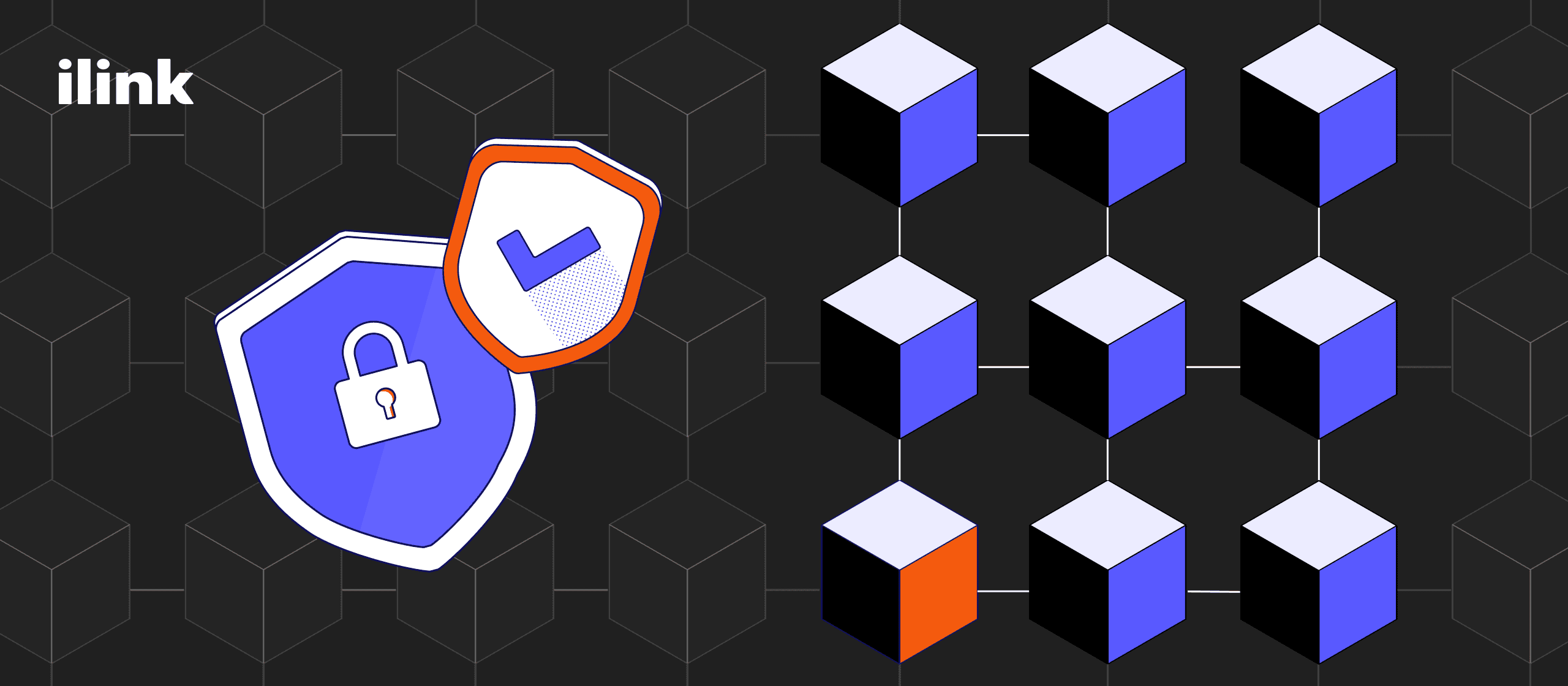How Secure is Blockchain

What Is Blockchain and How Works
As a starting point, let us briefly describe what a blockchain is and how it functions. It will be possible to assess the security level of the system through this process. Based on the meaning of the word, we can infer that it refers to a chain of digital blocks. Every block in this chain contains information about the block before. In general, it is a database of transactions. As a result of the hashing mechanism, the records in this database are immutable. Changing the information in the block leads to a change in the hash of the current and all subsequent blocks. Blockchain offers the advantage of transparency, since anyone can view the information in the blocks, but no one can alter or destroy them. Blockchain is an excellent solution for use in business processes in various industries.
Blockchain is used to store and transfer digital data. This can be both financial and non-financial assets. Blockchain technology allows an asset to be associated with unique information about its ownership. The information cannot be altered, deleted, or discretely changed in any way.
Blockchains are secured by using cryptographic techniques and mathematical models of behavior and decision making. The blockchain security model is used in many ways, such as banking, insurance and health care, the energy industry, e-voting, etc. In areas where identity and access to personal data are subject to special security controls, such technology is necessary.
Blockchain security varies depending on its type
- Public blockchain.
Anyone can access public blockchains. The network is controlled and operated by the entire community of network participants.
Advantages:
The ledger of such a system is transparent as it can be viewed at any time by members of the network. Each member participates in the consensus process and maintains a registry. As a result, its decentralized nature and consensus mechanisms make it difficult to corrupt.
An active role in the operation of a public blockchain ensures its security. Since there are so many nodes in the consensus network, it is almost impossible for attackers to gain control of it through an attack on the system.
Disadvantages: Due to the high energy consumption of public blockchains, transaction processing speed may be slower as the network needs a significant amount of power to function and achieve agreement. In contrast, private blockchains typically require less energy and may allow for faster transaction processing.
Moreover, any change in the operation of the network could create problems, as it is extremely rare for all members of the community to agree on proposed innovations without divergent viewpoints.
Let's take a closer look at some popular blockchain consensus algorithms, as they are what guarantee the security of the network and the authenticity of all the data stored in it. This algorithm ensures that all nodes in the network automatically agree about the current state of the network, in other words, the consensus algorithm is a set of principles and rules.
Proof-of-Work. PoW describes a consensus mechanism that requires computational effort from a network of devices and protects against double spending. The miners try to find the input of a hash function in exchange for a reward. Using this algorithm, miners compete for profits.
PoW is characterized by the addition of a task that is resource-intensive. This prevents double spending (the use of the same coin twice within the same period of time) and other abuses. The blockchain is also protected from DDoS attacks that attempt to flood the network with fake traffic.
However, this method of mining is not environmentally friendly. PoW requires a significant amount of computing power, raising concerns about its environmental impact.
Proof-of-Stake. Participants in a PoS network have to stake their coins to become validators, just owning coins isn't enough. They're granted the right to validate transactions and create a new block in a pseudo-random manner based on the number of coins it has locked in the blockchain. A validator must hold a certain amount of network tokens for a specified period of time in order to become a validator. They are rewarded in the form of a transaction fee or a specific coin.
PoS is popular due to the fact that it does not require the purchase of expensive mining equipment. Due to its decentralized nature, the blockchain is also highly secure.
- Private Blockchains.
The public blockchain network is generally well established as the infrastructure for electronic payment systems. There are attempts to adapt the public blockchain to the needs of enterprises to this day. However, for the majority of businesses, the public blockchain is still an inappropriate concept, due to its openness. This has resulted in the emergence of private blockchain networks with access control and a wide range of enterprise blockchain projects.
Blockchains that are private are blockchains in which the creation of blocks is centralized and all rights to perform such operations are owned by one organization. Information can only be viewed by the "general public" – audits, database management, and other applications can only be managed by trusted nodes.
Advantages:
Transactions are cost-effective. Due to the fact that transactions are only confirmed by a small number of computers, a private blockchain is less expensive. The result is a significant reduction in transaction fees. Furthermore, no new coins need to be mined, so the nodes consume less energy.
It is possible for the network owner to force changes to the blockchain. If they wish, they may edit or add new transactions.
Block creation on a private blockchain is often not subject to Proof-of-Work. It is still possible to attach this protocol in order to increase the level of security, simplify auditing, and to give users a greater level of control over the system.
There are many opportunities for businesses. It is possible for blockchains to be used as the basis for blockchain innovation in services that make use of ledgers or financial accounting systems. Integration of a private blockchain into the supply chain is one of the most striking examples of its use. As a result, it is possible to track and audit the entire chain in a transparent manner. This solution eliminates the problem of illegal data correction and increases trust among all parties involved.
Disadvantages:
Blockchains that are private are more vulnerable to hacks, risks, and data leaks/manipulations. An attacker can easily compromise the entire network. The private blockchain is therefore less secure than the public blockchain.
Enterprises Can Benefit from Blockchain Technology
Blockchain provides security for businesses through its key features such as immutability, decentralization and cryptography. This creates a more secure business environment.
Fight against counterfeiting and piracy. Blockchain helps retail chains that work with a large number of suppliers to increase consumer confidence. The technology makes it possible to track the entire supply chain from the manufacturer, and products can be checked for compliance with environmental and other standards.
Resolves conflict situations. The data cannot be corrected or deleted. Therefore, you can be sure of the authenticity of the information when resolving a conflict situation.
Enhances the security of financial transactions. Blockchain prevents data leakage, fraud and other cyber threats. It also provides a secure and transparent environment for business transactions.
We know that data governance drives business value. And that is why it is so important to pay special attention to cybersecurity. To prevent cyberattacks and fraud of the data building a blockchain, measures such as encryption, key management, access controls, and audit trails are implemented. Furthermore, enterprises may utilize consensus algorithms to ensure that all transactions on the blockchain are verified and validated by a network of nodes. To detect and address any vulnerabilities or potential threats to the blockchain network, other security measures may include the use of smart contracts, multi-factor authentication, and continuous monitoring and testing. The implementation of a robust blockchain security strategy is essential for enterprises seeking to leverage the benefits from the development of blockchain solutions.
Comments (0)
Latest Posts

Fortunately, blockchain is no longer a barrier to fast development—it’s a powerful foundation for rapid prototyping and MVP (Minimum Viable Product) launch.

Enter tokenized learning: a blockchain-powered approach that rewards learners for participation, achievement, and contribution—turning education into a dynamic, incentive-driven experience.
Do You Have any Questions?
Leave your details - we will contact you to answer all your questions

